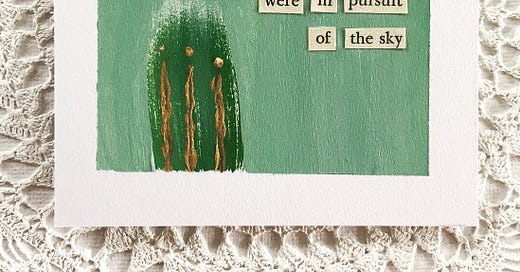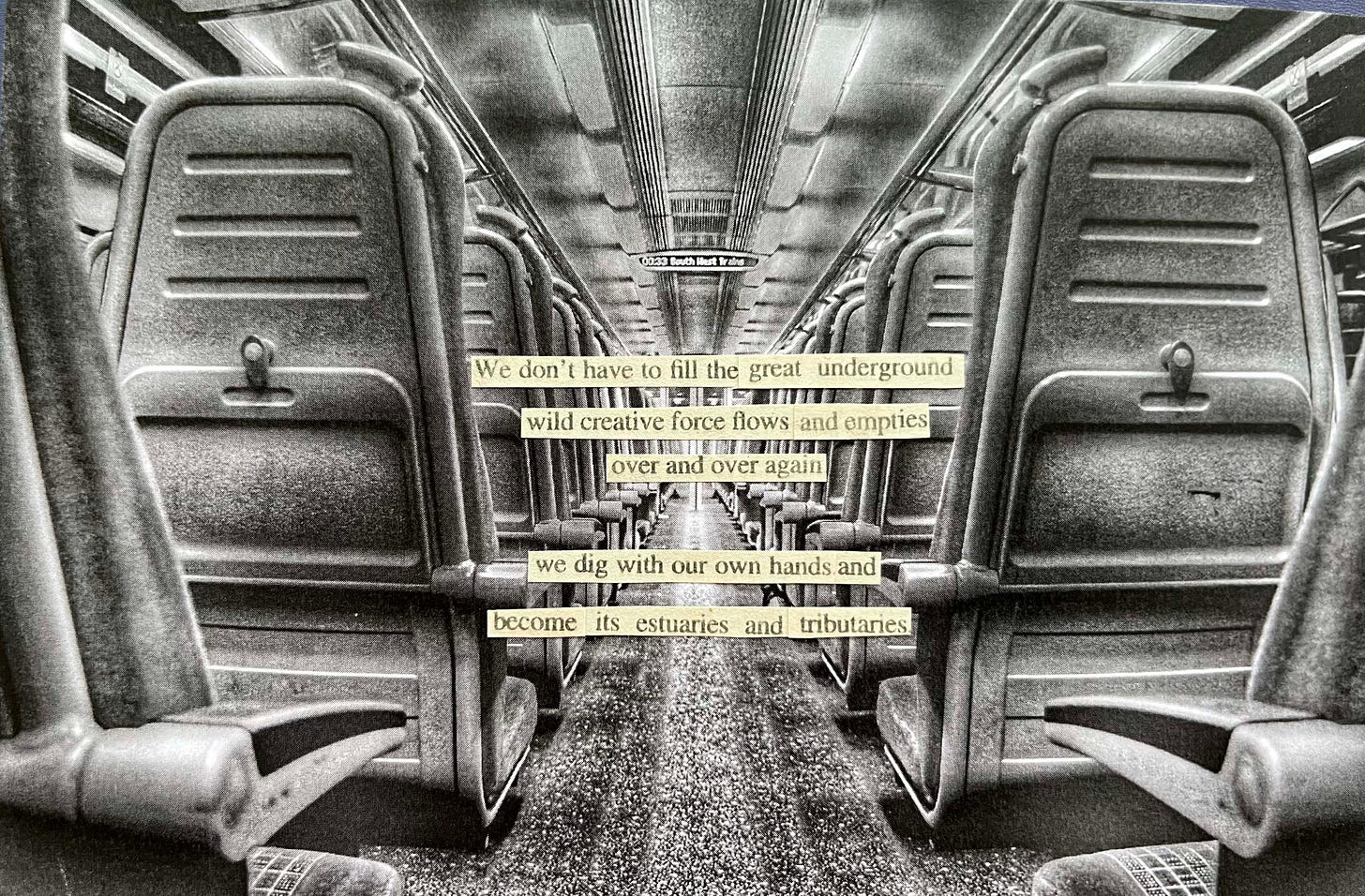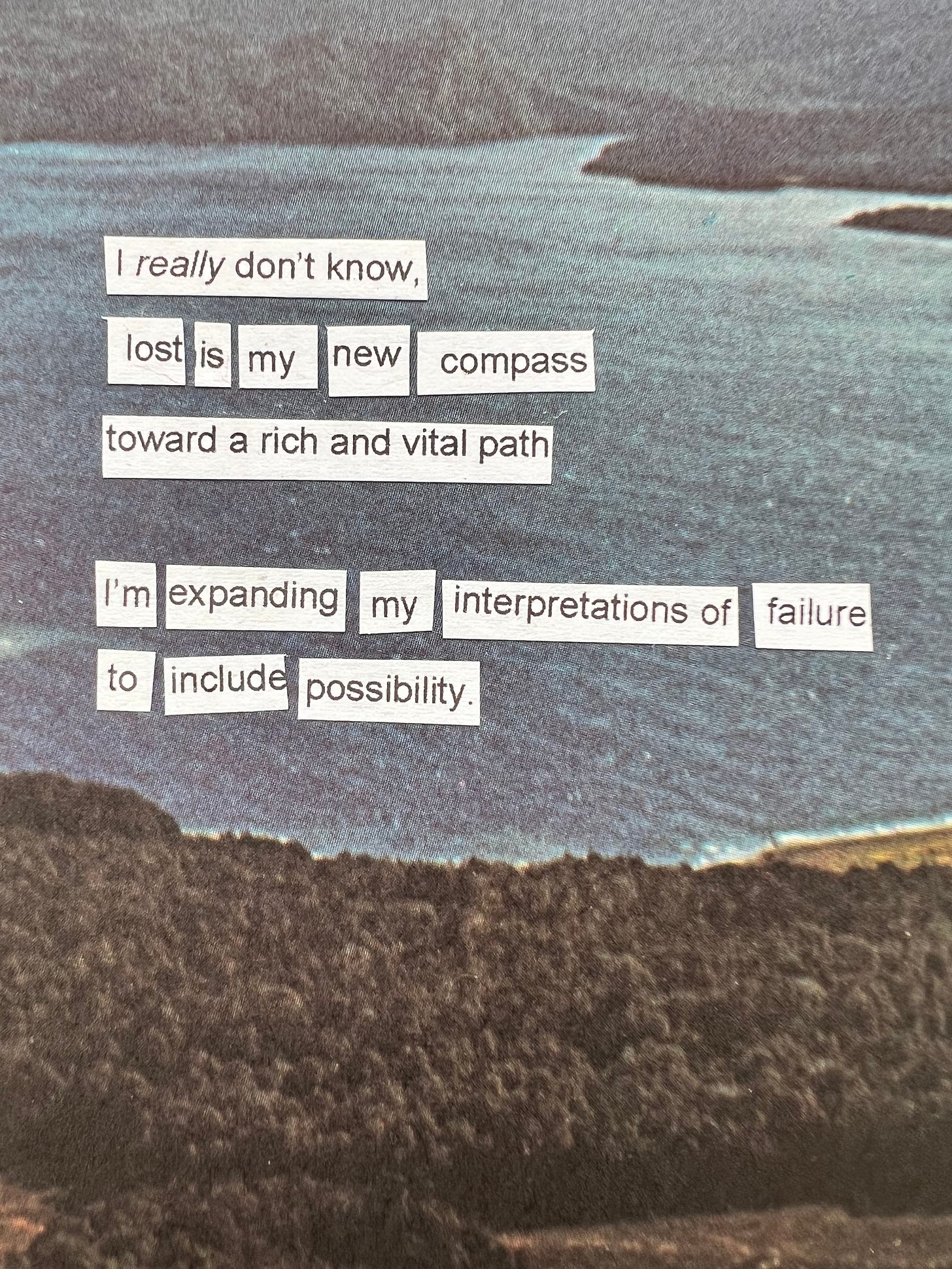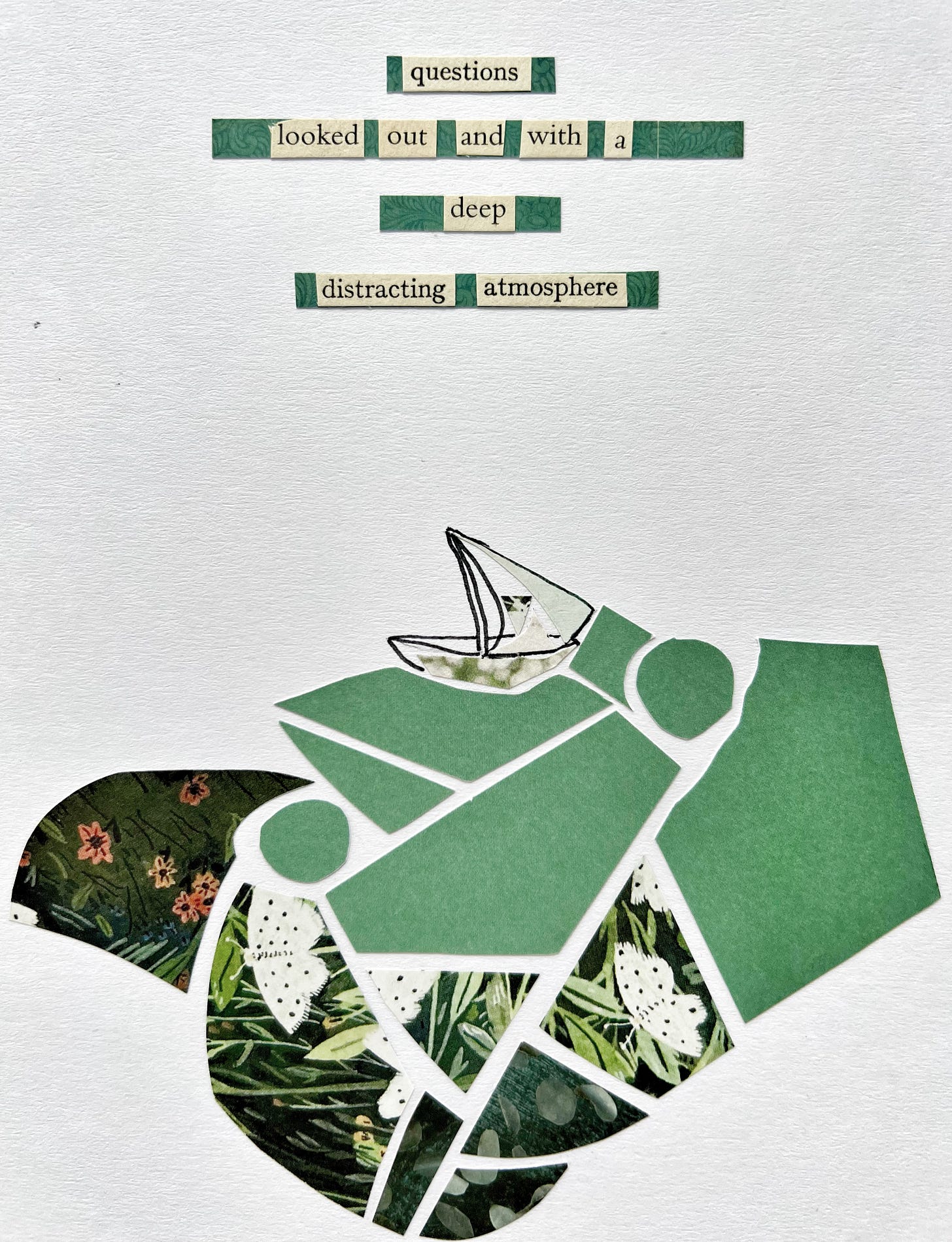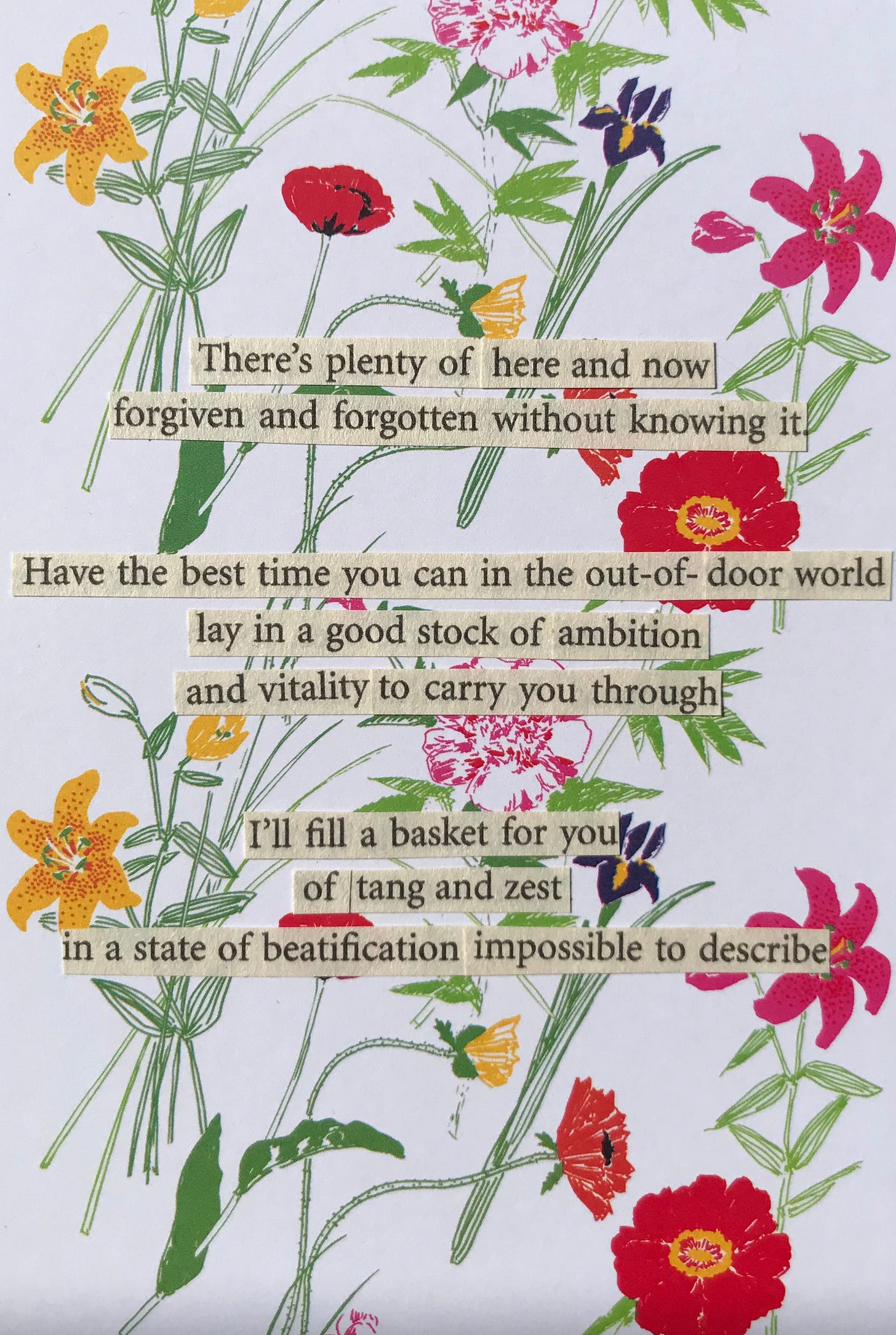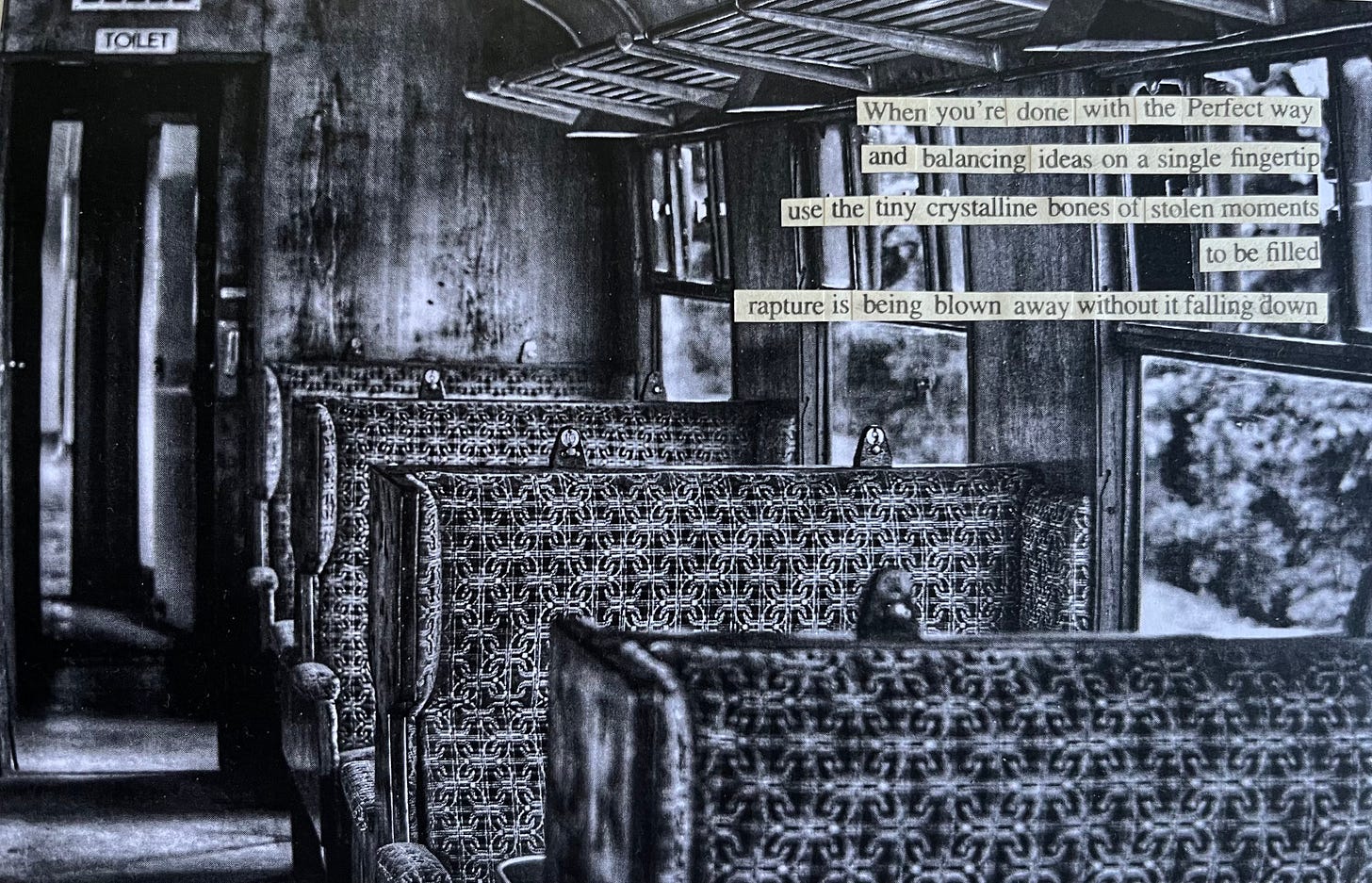Hitting the heart button is a simple and free way to support Asunder’s disruptive meaning-making mission.
To notice the extraordinary, we first need to have formed a belief about the world: eg. the winter is cold. These beliefs define what it means for something to be novel.
— Clayton Page Aldern
Hypothesis
Hypothesis (n.) from the Greek hypothesis meaning base, groundwork, foundation. hypo meaning under and thesis meaning a placing. Literally, ‘a placing under’.
The Seven of Pentacles invites us to return to our original hypothesis, the foundation we started from and ask if it still holds the weight of what we now know.
Pentacles’ time is wide, slow and methodical. Cards Ace through Six offer us different ways to inhabit the real world. To be in conversation with our bodies, other bodies, the environment, and our ideas about the world. This is what allows us to do what Aldern mentions in the quote above, “to have formed a belief about the world.” Now we get to experiment, to play with what isn’t true but could be.
A hypothesis arises out of curiosity; a point of reference to begin from and return to. It acts as a placeholder until there is more information available.
A hypothesis isn’t a question; it is a statement. The questions precede the hypothesis. A hypothesis is also not an outcome. However all three parts, the question, hypothesis and outcome, are woven into the tapestry of the Seven of Pentacles.
Question: Asking beautiful questions.
Questions fuel and nourish us in forming a hypothesis. They enable us to learn the language of wonder, awe and curiosity.
David Whyte says the two tenants to a beautiful question are that it has a hunger to it, and it brings you to ground. That is to say they lead us to the groundwork of a hypothesis.
Asking a question is important here. Often we ask questions in the hope of moving from uncertainty to certainty. But what if asking allows us to explore uncertainty further, rather than trying to leave it. What happens when we stay a little while? Sit in the space of hunger without immediate satiation?
Hypothesis: Risking an assumption.
In the creation of a hypothesis we put a stake in the ground, bringing what is moveable into a state of solidity for a while. It requires risk to create an assumption. To make a statement that says when I do this and this, the outcome will be this.
Discomfort and hypothesis stem from the same root word. The etymology of discomfort is to not prepare. When we prepare we are working towards eliminating uncertainty. However in forming a hypothesis we are only creating one statement of certainty and then using that as a way to gather a collection of uncertainties.
“In science, as in art and many other human activities, intuition comes first, certainties later.”
— Giorgio Parisi
Outcome: The braiding of success, failure and adjustment.
The outcome arrives after we have tested our hypothesis. It is so much more than success or failure, or finding out whether the assumption was correct or not.
Proving a hypothesis wrong doesn’t invalidate the experiment.
“I prefer the idea of failure being neither good nor bad, just a fact of life, what comes after what is done.”
— Johanna Hedva
The journey of understanding is in the working, not the answer.
When we hold the information of the outcome, we can return to the hypothesis and see if it still holds the solidity we gave it for a while.
The information and experience gathered along the way funnel us back into the realm of questioning. We then update our foundation then set our sights on the next curiosity.
Instead of inquiring into an existing certainty the Seven of Pentacles invites us to create a new certainty and then test it to see whether it holds up. This card asks us to become the foundation makers. To look out and see what is not yet known and spend time investigating the possibility and proof of the next ground on which to stand.
I think it is in our nature to have an ebb and a flow. The tide comes in and out, right? The phases of the moon. The seasons of the year. Sometimes you go in hard and you fight, sometimes you have to stop. Regenerate. We inhale and exhale. Everything has a rhythm.
So often we only tap into joy or self-care or self-compassion when we’re spent. It might be a little too late then. What if we front-loaded it? Gathered the energy before we went in to change the world and do good things?
— Karen Walrond (edited from a podcast conversation with Brené Brown)
Replenish
Replenish (v): from the French stem replenir meaning to fill up …. possibly based on the notion of fill repeatedly thus to fill completely.
Deplete (v): from the Latin deplere literally meaning to to un-fill.
Care (v): from the Old English cearu meaning sorrow, anxiety and grief; a burden of mind.
In the Seven of Pentacles we practice replenishment to subvert the toxic impasse of self-care. We let go of the relentless work of trying to get ourselves right in a paradigm that only rewards brokenness and failure. We turn toward self -tending and -devotion firmly rooted in the dynamic movement of filling up and emptying out.
We’ve known for so long we cannot continue in the wilfully neglectful way patriachal grind culture demands. That self-annhilation is a given on this path. Yet it’s inevitable that we don’t stop. Self-care demands that we don’t. It needs us to arrive at it’s doorstep destroyed.
How could we be different if we escaped that slippery slope (for good) and stopped having to rescue ourselves from the abyss where we’ve slayed ourselves?
Here, we stop abandoning ourselves and reconnect with ourselves from a place of self-fidelity. Our essential self-bond strengthens and flourishes into a deep and unwavering partnership. One characterised by the same faithful and unfailing commitment we share with those we love fiercely. It’s the epitome of presence and patience.
Because, what if we were true to ourselves?
What if we didn’t position our wants, needs and desires on an unobtainable pedestal, nor rendered them inconsequential dust?
What if our inability to do self care isn’t a metric of our lack (time, follow through, dedication, commitment) or hopelessness (why can’t we turn up for ourselves)?
What if refusing self-care is an act of resistance? What if we’ve been fighting it to protect our already vulnerable selves from further annihilation?
What if “failing” at self-care is “winning” at not being framed as broken, vulnerable, sick, frail, disempowered or marginalised? Not sure, consider who we care for: the sick, young and elderly, then by extension anyone or anything frail, marginalised, disempowered or at risk. We don’t care for people robust in mind, body, heart and soul.
The Seven of Pentacles proposes replenishment as better way of being. It means detoxing ourselves from the unwieldy umbrella term of self-care and its flawed central premise: to care for ourselves, first there must be something (horribly) wrong with us.
It also liberates us from the double bind of self-care as weaponised performance management (when we can no longer honour our responsibilities suddenly everyone’s asking us: what are your doing about self care?) or guilted for being selfish, lazy or indulgent. Freed, we can proprise ourselves without shame, doubt or recrimination.
Proactive, responsible, imperfect and incremental, replenishment allows us to start now. We don’t have to wait for illness and burn-out as permission slips to focus on ourselves. It lets us meet ourselves exactly where we are. And how we are. Letting that be vastly different from one day to the next.
How would our lives change if we spoke the language of fullness and emptiness, as nuanced spectrums rather than absolutes of catastrophic depletion?
What would happen if we allowed ourselves to experience fullness? And to also, authentically, know feeling emptied out?
Not empty, but emptied out.
Empty is what capitalism wants us to feel. The gnawing hole inside that needs to be filled with constant consumption. The chasm that doom-scrolling just digs deeper. A hollowness where loneliness and pointlessness remind us of all the ways we are never enough (and never will be, so why the fuck bother?)
Being emptied out is a sense of having done our absolute best at life on any given day. The quiet ebb that comes with the fulfilment of having done. It’s not sexy. Nor glorious. And definitely not instagram-worthy. It’s a settledness, a resting state with a definitive point for reset. It’s the antithesis of collapse which most of us know as “rest”.
Nobody shames the ocean for having a low tide.
The Seven of Pentacles offers a relationship with fullness as a remediation of decades of linear depletion. Replenishment, at its core, is about refilling, over and over again. It is dynamic. Cyclic. Rhythmic. We are perptually in flux. We fill. We empty. And we refill again.
What if, having found our center in the five, we trust we can grow from here. And if we wander too far or spin too far out of control, and know how to find our way back. Replenishment offers endlessly beginnings. It honours our messily imperfect. We get new insights by leaving/losing and returning/regaining that center.
Living within replenishment, we choose aliveness, done worshipping at the altar of brokenness. We go into the world from a place of fullness. No longer running on fumes. We empty ourselves out in the best possible way and return to refill.
To do this, the Seven of Pentacles demands we quit cannibalising our self-loathing to rediscover (and use) our self-tending tools, practices and rituals, collected over the decades. This stocktake unearths our extensive personal repository that nurtures and delights our body, heart, mind and soul. They get a second life, with revitalised meaning. They become on-ramps to aliveness. With discernment we seek out additional resources to complement this new direction
The Seven of Pentacles is the life-long, self-affirming process of choosing ourselves as fierce advocates of fullness. We grow into proactive, flexible, responsive and adaptive experts of aliveness on our own terms. Replenishment becomes like breathing; our ebb and flow, our fill-empty-refill, vitally intrinsic (and automated) to our personal wellness. And as we thrive, the legacy of replenishment allows our families, workplaces, neighbourhoods and communities to flourish alongside us.
Poetry
convergence with / change / needed to be about the / capacity for sorrow / expressed often
— Christina
small dark holes appeared / underfoot / as we climbed the seven flights of fear
— Jodi
Anchoring Practice
Habit Hypothesis - Christina
When Kaylee was small I came across the idea that children are little scientists. When a child is sitting in a high chair and pushing things off it, they aren’t thinking oh I’m making things difficult for everyone around me, they are performing experiments. What happens if I push this off? What happens if I do it again? How many times will I get the same result?
They are constantly forming and updating hypotheses about the world. I am often thinking about how I can bring in some of that childlike wonder into my day to day.
When writing this week I began wondering what would happen if I brought more of an experimentation mindset into the realm of habit formation. I am always trying to “change my life” with some new daily habit.
What if instead of deciding this is the new habit I am going to begin, I created a hypothesis and then spent the week testing it. Collecting data. Re-evaluating it.
Instead of deciding every day this week I will go for a walk, we created the following hypothesis: walking for thirty minutes a day improves my mood (or if you are like me, and work better with a little friction, the hypothesis could be: walking for thirty minutes a day makes me grumpy).
Once you have your hypothesis, the week is then spent experiencing the hypothesis and gathering data/evidence that both proves and disproves your statement.
Framing it as an experiment creates a little distance to explore how this habit might work for you (or against you), rather than making a rigid commitment that then creates guilt and shame if you don’t follow through.
More or Less — Jodi
The phrase “more or less” speaks to an approximation. In these practices we are seeking an approximation of filling up—whether that be through simplification/staunching the drain or amplification/pepping-up without artificial stimulants
More
Experiment with simple hacks that bring your energy up, give you a sense of fullness, freedom or inspire awe.
Music is mine. This three-song playlist is my current on-ramp for inspired action. Back when I was writing the first draft of my novel, I had a six-song disco playlist that I listened to in the shower.
A bigger hack I’ve experimented with this year is dancing. One hour of dancing a week fills me in unexpected ways across the week.
What are your hacks? (Leaves us a comment)
Loss
Every week, take one thing from your to-do list.
Stretch goal — every day take one thing from your to-do list.
More-Or-Less
Experiment with yourself as an actual physical vessel and the metrics (measurements) of full or empty.
How full are you in the morning? How does that differ across the week?
How empty are you at night? How does that differ across the week?
Are there different nuances of fullness or emptiness?
How does your experience change, and what new data do you get, when you play with “empty” and “full”, words outside of the language of burn-out, overwhelm and chronic stress.
Journal Prompts
Seven weeks ago we began our pentacles journey, talking about hope and the risk of disappointment and failure inherent in it. What questions did you have about living in hope back then? What kind of hope did you want to live into? What have you discovered since then? What kind of alterations need to be made to your foundational understanding in light of your experience? What new statement do you have about hope?
We also started the pentacles talking about beginnings and the complexity of nothing every really being new? What questions did you have about what was new and what might be new again back then? What beginnings did you intitate (or how did you thinking about starting change)? What have you discovered since then? What kind of alterations need to be made to your foundational understanding in light of your experience? What new statement do you have about the process of beginning?
In what ways have you struggled with self-care? What have you hated most about self-care? Has anything about it been easy, easeful or joyful?
Let’s do an inventory of self-tending resources. What have you tried in the past and loved? What have you tried in the past and been ambivalent about? What have you tried and outright hated? What have you always wanted to try and never quite got around to it? How do you prefer to self-tend? Alone? With a partner? In an aligned groups? Out in the wild with whoever and whatever goes. What are you currently doing? And what do you wish you were doing?
How does the word replenish land in your body? Your heart? Your soul? How do you feel about the intersection of aliveness and replenishment? Does it offer a new beginning? Hope? What might be possible with replenishment that’s always been impossible under the paradigm of self-care?
Playlist
And to round it all out, an almost three-hour musical exploration of the Seven of Pentacles themes.


